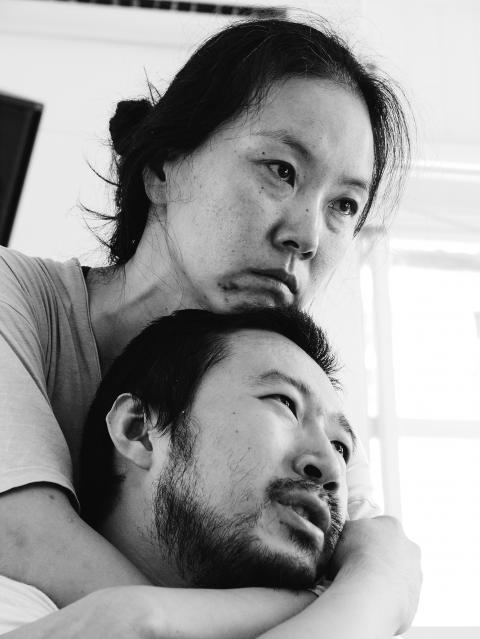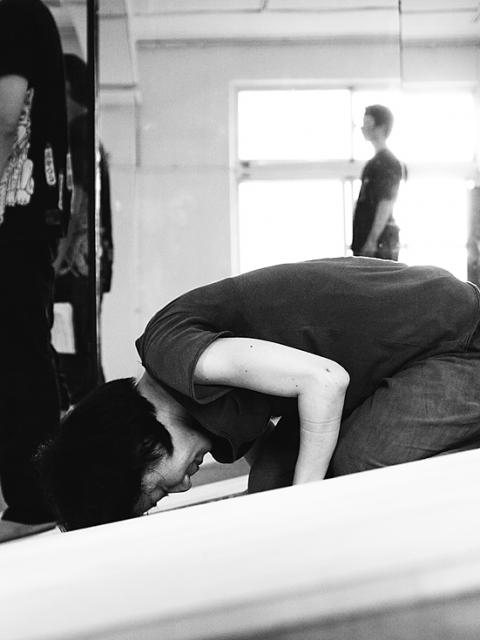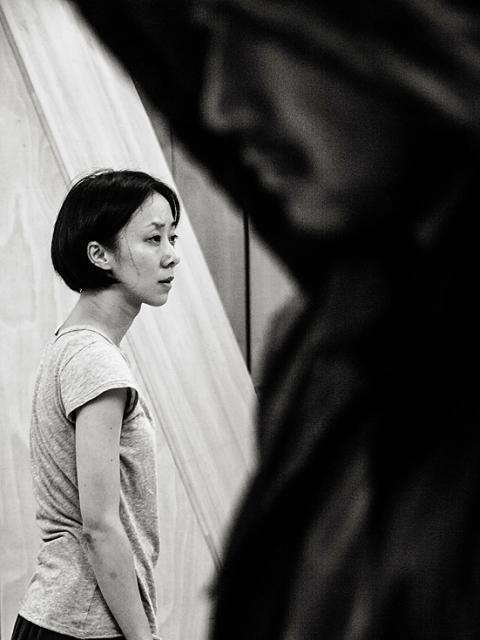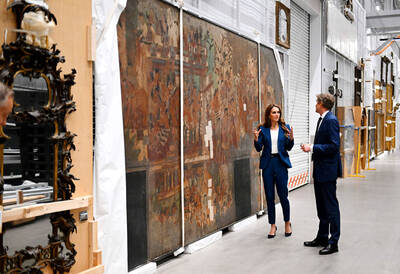Antigone, the courageous heroine who defied the ruler of Thebes in Sophocles’ Greek tragedy of the same name, transforms into an East Asian rebel in a new work by Wang Mo-lin (王墨林).
Widely considered Taiwan’s maestro of experimental theater, Wang’s oeuvre has focused on the realities of war, violence and the nation state.
Wang first conceptualized the project in 2009 when he worked with South Korean actress Hong Seung-yi on Mom, Bye (再見!母親), a theatrical performance about a mother and her 22-year-old son who set himself on fire and whose death spurned workers, university students and activists into action in 1970.

Photo courtesy of Hsu Ping
“Hong displayed a sense of energy and stage presence that you rarely find in Taiwanese performers. I immediately thought of Antigone, the classic icon of the female rebel, and wanted to make new interpretations of the role,” Wang told the Taipei Times.
In Sophocles’ Antigone, the heroine attempts to bury her brother Polynices, who is killed in the battle for the throne of Thebes. The victor of the battle, Creon, orders that Polynices be left unburied on the battleground as punishment. Despite the fatal consequence of her action, Antigone rebels against Creon’s law in order to do what is right and honorable.
In Wang’s adaptation, Creon’s unjust decree is replaced by oppressive regimes in East Asia, and the characters from Antigone guide local audiences through the series of historical events including the 228 Incident and White Terror era in Taiwan and China’s Tiananmen Square protests.

Photo courtesy of Hsu Ping
The Gwangju Uprising , which occurred in the southwestern city of Gwangju in South Korea in 1980, is featured prominently in the play. Hong takes the stage in the lead role, guiding audiences through a massacre that happened 33 years ago when a group of students and other demonstrators took the streets to protest martial law enforced by military strongman General Chun Doo-hwan. Within days, protests spread to become all-out urban warfare, which was brutally quelled by the army.
Wang’s Antigone also stars actors from Taiwan (Cheng Yin-chen, 鄭尹真) and China (He Yufan, 何雨繁). He said the production is an experiment in which the actors learn to feel the rhythm and cadence in each other’s voices and bodies in order to create dialogues, all while uttering lines in languages that are foreign to each other.
Wang also wishes to explore the intimate relationship between Antigone and Polynices, the daughter and son of the incestuous marriage between King Oedipus and his mother Jocasta.

Photo courtesy of Hsu Ping
“On one hand, the family is scarred with incest. On the other, the brother is deemed a rebel and traitor. The double marginalization will surely bring the family members closer to each other,” the director said. “I want to portray that sense of solitude and love. It is not about incestuous affairs and sex, but a shared sense of beauty and mutual affection.”
Neither is the play about the history of a particular country, says Wang. Instead, it is a story about “people’s uprisings against autocratic regimes during the Cold War era.”
“What connects the three regions is the exercise of martial law, through which a nation legally oppresses and kills its people. Martial law may not disappear forever; the cold war may return and history can repeat itself. But as long as we remember what has happened in the past, we can learn from it,” Wang said.
The performance will be in Korean and Mandarin with Chinese subtitles.

June 9 to June 15 A photo of two men riding trendy high-wheel Penny-Farthing bicycles past a Qing Dynasty gate aptly captures the essence of Taipei in 1897 — a newly colonized city on the cusp of great change. The Japanese began making significant modifications to the cityscape in 1899, tearing down Qing-era structures, widening boulevards and installing Western-style infrastructure and buildings. The photographer, Minosuke Imamura, only spent a year in Taiwan as a cartographer for the governor-general’s office, but he left behind a treasure trove of 130 images showing life at the onset of Japanese rule, spanning July 1897 to

One of the most important gripes that Taiwanese have about the Democratic Progressive Party (DPP) is that it has failed to deliver concretely on higher wages, housing prices and other bread-and-butter issues. The parallel complaint is that the DPP cares only about glamor issues, such as removing markers of Chinese Nationalist Party (KMT) colonialism by renaming them, or what the KMT codes as “de-Sinification.” Once again, as a critical election looms, the DPP is presenting evidence for that charge. The KMT was quick to jump on the recent proposal of the Ministry of the Interior (MOI) to rename roads that symbolize

On the evening of June 1, Control Yuan Secretary-General Lee Chun-yi (李俊俋) apologized and resigned in disgrace. His crime was instructing his driver to use a Control Yuan vehicle to transport his dog to a pet grooming salon. The Control Yuan is the government branch that investigates, audits and impeaches government officials for, among other things, misuse of government funds, so his misuse of a government vehicle was highly inappropriate. If this story were told to anyone living in the golden era of swaggering gangsters, flashy nouveau riche businessmen, and corrupt “black gold” politics of the 1980s and 1990s, they would have laughed.

Imagine being able to visit a museum and examine up close thousand-year-old pottery, revel alone in jewelry from centuries past, or peer inside a Versace bag. Now London’s V&A has launched a revolutionary new exhibition space, where visitors can choose from some 250,000 objects, order something they want to spend time looking at and have it delivered to a room for a private viewing. Most museums have thousands of precious and historic items hidden away in their stores, which the public never gets to see or enjoy. But the V&A Storehouse, which opened on May 31 in a converted warehouse, has come up